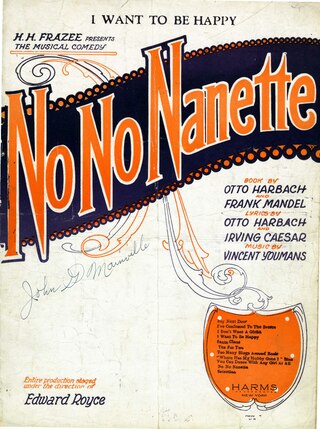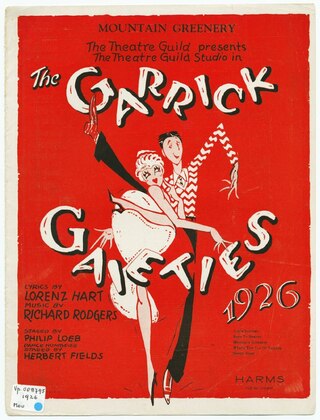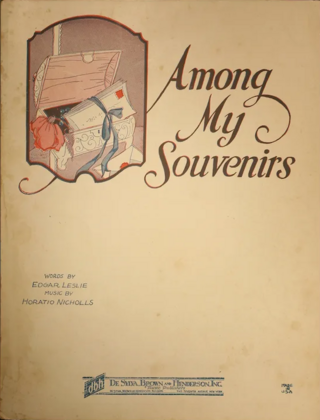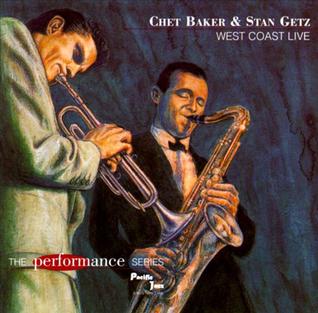
Roger Wolfe Kahn was an American jazz and popular musician, composer, bandleader and an aviator.

"Night and Day" is a popular song by Cole Porter that was written for the 1932 musical Gay Divorce. It is perhaps Porter's most popular contribution to the Great American Songbook and has been recorded by dozens of musicians. NPR says "within three months of the show's opening, more than 30 artists had recorded the song."
"Autumn Leaves" is the English-language version of the French song "Les Feuilles mortes" composed by Joseph Kosma in 1945. The original lyrics were written by Jacques Prévert in French, and the English lyrics were by Johnny Mercer. An instrumental recording by pianist Roger Williams was a number one best-seller in the US Billboard charts of 1955.

"Side by Side" is a popular song by Harry M. Woods written in 1927, and is now considered a standard.
"If I Were a Bell" is a song composed by Frank Loesser for his 1950 musical Guys and Dolls.

Tea for Two is a 1950 American musical romantic comedy film starring Doris Day and Gordon MacRae, and directed by David Butler. The screenplay by Harry Clork was inspired by the 1925 stage musical No, No, Nanette, although the plot was changed considerably from the original book by Otto Harbach and Frank Mandel; and the score by Harbach, Irving Caesar, and Vincent Youmans was augmented with songs by other composers.

"I Want to Be Happy" is a song with music by Vincent Youmans and lyrics by Irving Caesar written for the 1925 musical No, No, Nanette.
"Sometimes I'm Happy" is a popular song. The music was written by Vincent Youmans, the lyrics by Irving Caesar. The song was originally published in 1923 under the title "Come On And Pet Me," with lyrics by Oscar Hammerstein II and William Cary Duncan.
"Moonglow", also known as "Moonglow and Love" is a 1933 popular song. The music was by Will Hudson and Irving Mills and the words were by Eddie DeLange.

"Somebody Loves Me" is a popular song, with music written by George Gershwin, and lyrics by Ballard MacDonald and Buddy DeSylva. The song was published in 1924 and featured in George White's Scandals of 1924.
"Love Walked In" is a song composed by George Gershwin, with lyrics by Ira Gershwin. The tune was composed in 1930, but the lyric was not written until 1937, for the movie musical The Goldwyn Follies (1938), where it was sung by Kenny Baker. Hit versions include Sammy Kaye (1938), The Hilltoppers (1953), Ella Fitzgerald (1959), The Flamingos (1959) and Dinah Washington (1960). Artie Shaw recorded the song in the early 1940s.
"Witchcraft" is a popular song from 1957 composed by Cy Coleman with lyrics by Carolyn Leigh.

"Mountain Greenery" is a popular song composed by Richard Rodgers, with lyrics by Lorenz Hart for the musical The Garrick Gaieties (1926). It was first performed on stage by Sterling Holloway.

"Way Down Yonder in New Orleans" is a popular song with music by John Turner Layton Jr. and lyrics by Henry Creamer. First published in 1922, it was advertised by Creamer and Layton as "A Southern Song, without A Mammy, A Mule, Or A Moon", a dig at some of the Tin Pan Alley clichés of the era.
"Just You, Just Me" is a song from the 1929 musical film Marianne, composed by Jesse Greer with lyrics by Raymond Klages. It was introduced by Marion Davies and Lawrence Gray. The song has had many revisions after its first appearance and has become a jazz standard, having been recorded instrumentally by Red Norvo, Stan Tracey, Oscar Peterson and Lester Young, Buddy Rich, Artie Shaw, Les Paul, Benny Carter, Buddy Bregman, Tex Beneke, Coleman Hawkins, Harry James, Erroll Garner, Benny Goodman, Earl Hines, Joe Pass, Buddy Tate and Abdullah Ibrahim, Les Brown, Bill Evans, Bill Coleman and Duke Ellington.

"Among My Souvenirs" is a 1927 song with words by Edgar Leslie and music by Horatio Nicholls.

The period from the end of the First World War until the start of the Depression in 1929 is known as the "Jazz Age". Jazz had become popular music in America, although older generations considered the music immoral and threatening to cultural values. Dances such as the Charleston and the Black Bottom were very popular during the period, and jazz bands typically consisted of seven to twelve musicians. Important orchestras in New York were led by Fletcher Henderson, Paul Whiteman and Duke Ellington. Many New Orleans jazzmen had moved to Chicago during the late 1910s in search of employment; among others, the New Orleans Rhythm Kings, King Oliver's Creole Jazz Band and Jelly Roll Morton recorded in the city. However, Chicago's importance as a center of jazz music started to diminish toward the end of the 1920s in favor of New York.
"I Can't Believe That You're in Love with Me" is a 1926 popular song and jazz standard composed by Jimmy McHugh, with lyrics by Clarence Gaskill.

West Coast Live is a live album by trumpeter Chet Baker and saxophonist Stan Getz which was recorded in California in 1953 but not released until 1997, on the Pacific Jazz label.











